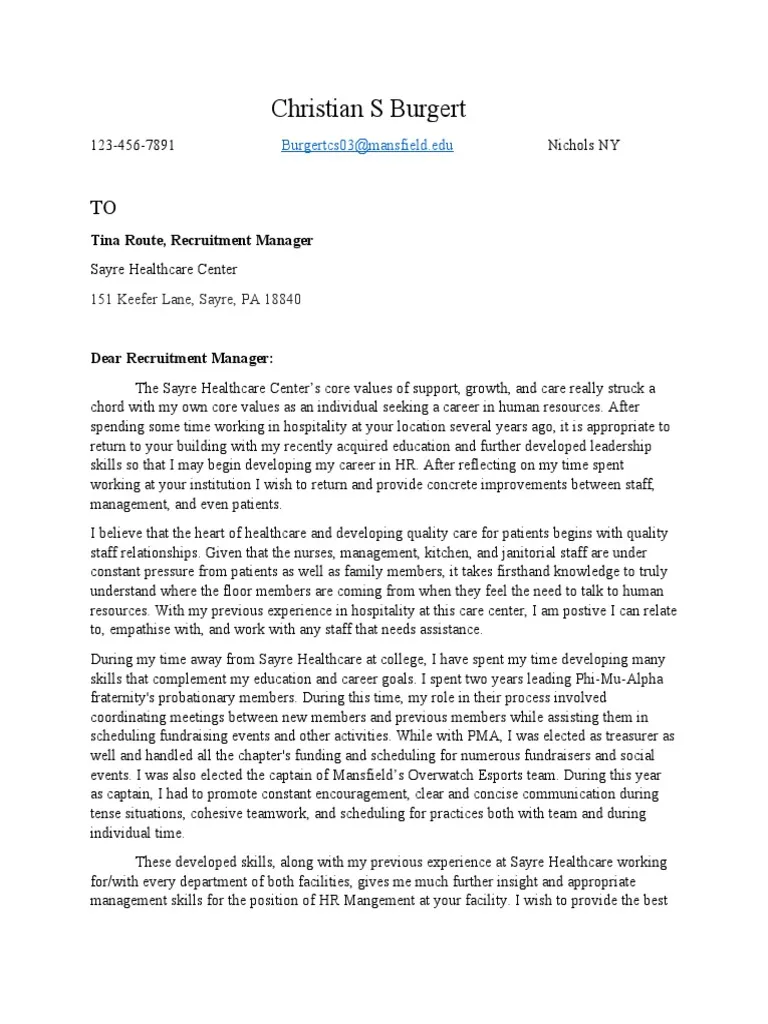Why Health Care Cover Letters Matter
In the competitive world of healthcare, a well-crafted cover letter can be the key to unlocking your dream job. It serves as your initial introduction to potential employers, providing an opportunity to showcase your skills, experience, and passion for the field. Unlike a resume, a cover letter allows you to connect with the hiring manager on a personal level, demonstrating your personality and conveying why you are the perfect fit for the role. A strong cover letter is not merely a formality; it’s a strategic tool for highlighting your qualifications and making a lasting impression. It’s your chance to go beyond the bullet points and tell a compelling story that sets you apart from other applicants. By addressing specific job requirements and demonstrating your understanding of the healthcare industry, you can significantly increase your chances of securing an interview.
The Importance of a Strong Cover Letter
A weak cover letter can be a deal-breaker. It’s often the first thing a hiring manager reads, and it can immediately determine whether your application gets a second look. A poorly written letter filled with errors, generic phrases, or a lack of focus can signal a lack of attention to detail and a lack of genuine interest in the position. Conversely, a strong cover letter demonstrates professionalism, attention to detail, and a genuine enthusiasm for the opportunity. It should be tailored to the specific job and employer, highlighting the most relevant skills and experiences. Furthermore, a well-written cover letter provides an opportunity to address any potential concerns or gaps in your resume. For example, if you’re switching careers or have a gap in your employment history, your cover letter is the perfect place to explain the situation and reassure the hiring manager.
Key Elements for Health Care Cover Letters
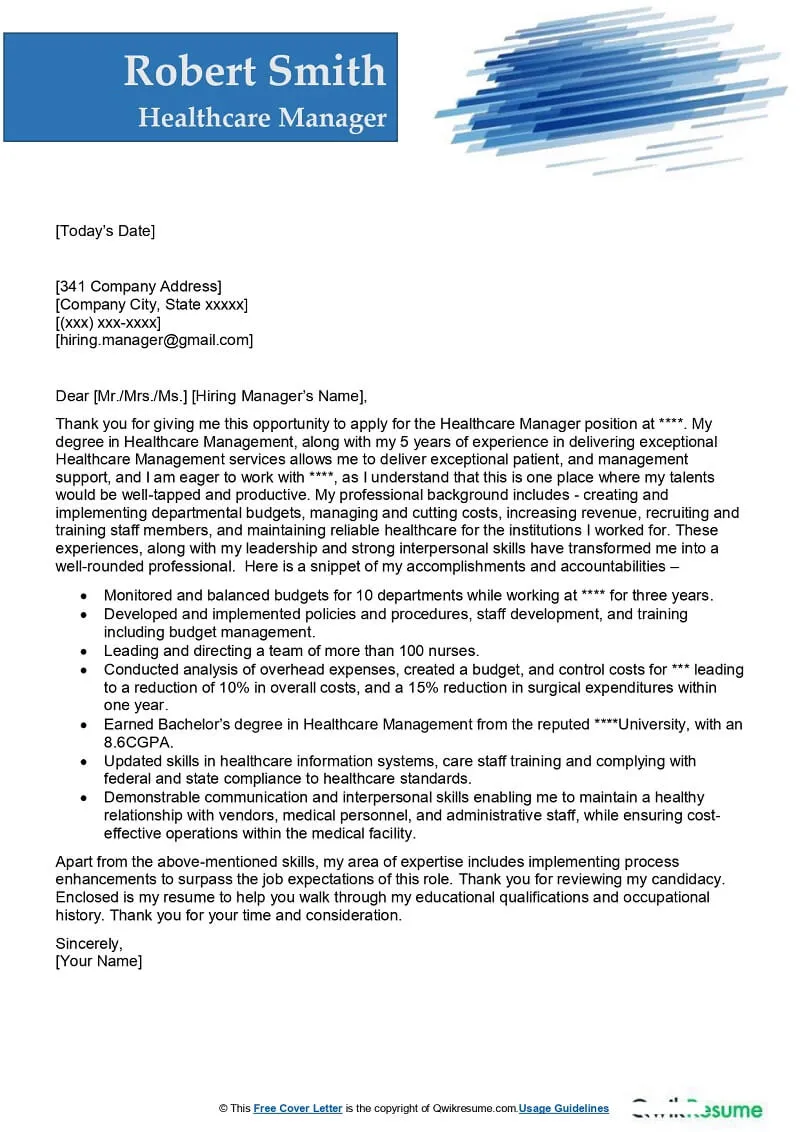
Crafting an effective healthcare cover letter requires attention to several key elements. Begin with a professional header including your contact information, the date, and the employer’s contact details. The opening paragraph should immediately grab the reader’s attention by stating the position you’re applying for and expressing your enthusiasm. The body of the letter should then highlight your relevant skills and experiences, providing specific examples to demonstrate your abilities. Avoid generic statements; instead, focus on quantifiable achievements and results. Your cover letter should demonstrate your understanding of the healthcare industry, your knowledge of the specific organization, and your commitment to providing quality patient care. Finally, end with a strong closing paragraph that reiterates your interest in the position, thanks the hiring manager for their time, and includes a call to action, such as requesting an interview. Proofreading is essential to eliminate any errors.
Highlighting Relevant Skills
When showcasing your skills, it’s important to align them with the job description. Healthcare positions require a diverse skill set, ranging from technical abilities to soft skills. Identify the key skills the employer is seeking and highlight them in your cover letter. Use action verbs to describe your accomplishments and provide specific examples. For instance, instead of stating, “I have experience in patient care,” you could write, “Provided compassionate patient care to an average of 20 patients daily, resulting in a 95% patient satisfaction rating.” Tailor your skills section to each job application, emphasizing those skills that are most relevant to the specific role. This demonstrates your understanding of the position and your ability to meet the employer’s needs. Consider including examples of your problem-solving abilities, teamwork skills, and communication skills, as these are highly valued in healthcare environments.
Showcasing Your Experience
Your cover letter should provide more than just a list of your past positions; it should tell a story of your career progression and accomplishments. Focus on experiences that align with the requirements of the job you’re applying for. Briefly describe your previous roles, emphasizing your responsibilities and achievements. Whenever possible, quantify your accomplishments using numbers and statistics. For example, if you reduced patient wait times, specify by how much. If you implemented a new process that improved efficiency, explain the results. This helps employers understand the impact of your work. Consider including details about any special projects you’ve undertaken, any awards or recognition you’ve received, and any professional development activities you’ve participated in. Make sure your experience is presented in a clear, concise, and compelling manner.
Formatting Your Cover Letter
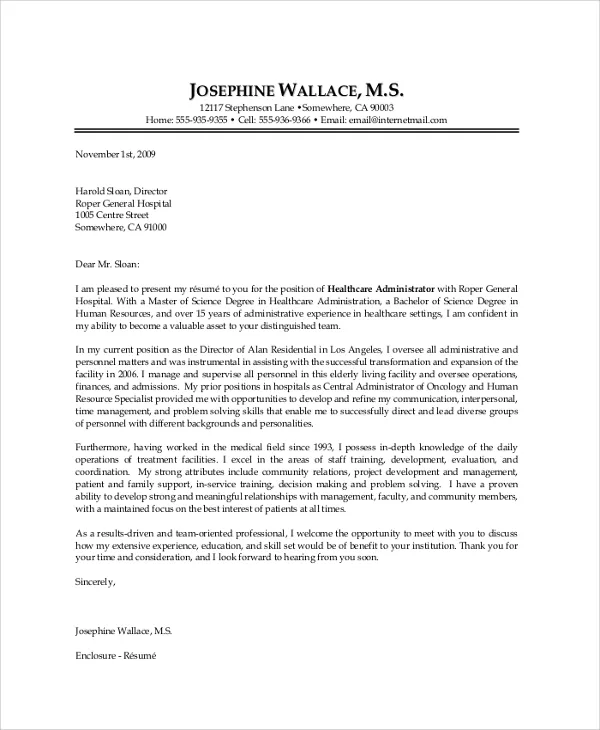
The format of your cover letter is just as important as the content. Use a professional font, such as Times New Roman, Arial, or Calibri, with a font size of 11 or 12 points. Maintain a clean and organized layout, with clear paragraphs, ample white space, and consistent formatting. The letter should be no more than one page in length. Begin with a professional header containing your contact information and the date, followed by the employer’s contact information. Use a formal salutation, such as “Dear Mr./Ms./Mx. [Last Name],” if possible. The body of the letter should be divided into clear paragraphs, each addressing a specific point. Use bullet points or numbered lists to highlight key skills or accomplishments. Finally, end with a professional closing, such as “Sincerely” or “Respectfully,” followed by your typed name and signature (if submitting a physical copy).
Health Care Cover Letter Sample 1 RN
This sample cover letter targets a Registered Nurse (RN) position. It should highlight clinical skills, experience in patient care, and relevant certifications. It emphasizes experience with specific patient populations, such as critical care, pediatrics, or geriatrics, and demonstrates a commitment to patient safety and quality outcomes. It needs to showcase experience with electronic health records (EHR) systems, medication administration, and other essential nursing duties. The letter should also include any leadership roles or achievements, such as mentoring new nurses or participating in quality improvement initiatives. RN cover letters should be written concisely, showcasing the ability to make quick decisions and maintain composure in critical situations. The overall goal is to show how the applicant’s skills and experience align perfectly with the requirements of the nursing role.
Key Qualifications for RNs
Key qualifications for RNs typically include a valid nursing license, a Bachelor of Science in Nursing (BSN) degree (or an Associate Degree with a plan to obtain a BSN), and relevant certifications (such as BLS, ACLS, or specialized certifications). Strong clinical skills, including the ability to assess patients, administer medications, and develop care plans, are crucial. Effective communication and interpersonal skills are vital for interacting with patients, families, and other healthcare professionals. RNs must be detail-oriented, organized, and able to work independently as well as part of a team. Experience with electronic health records (EHR) and proficiency in medical terminology are also expected. Additional qualifications may include experience with specific patient populations, such as critical care, pediatrics, or geriatrics. Experience with implementing nursing practices, in line with the latest findings, also greatly benefits the application.
Formatting a Nurse Cover Letter
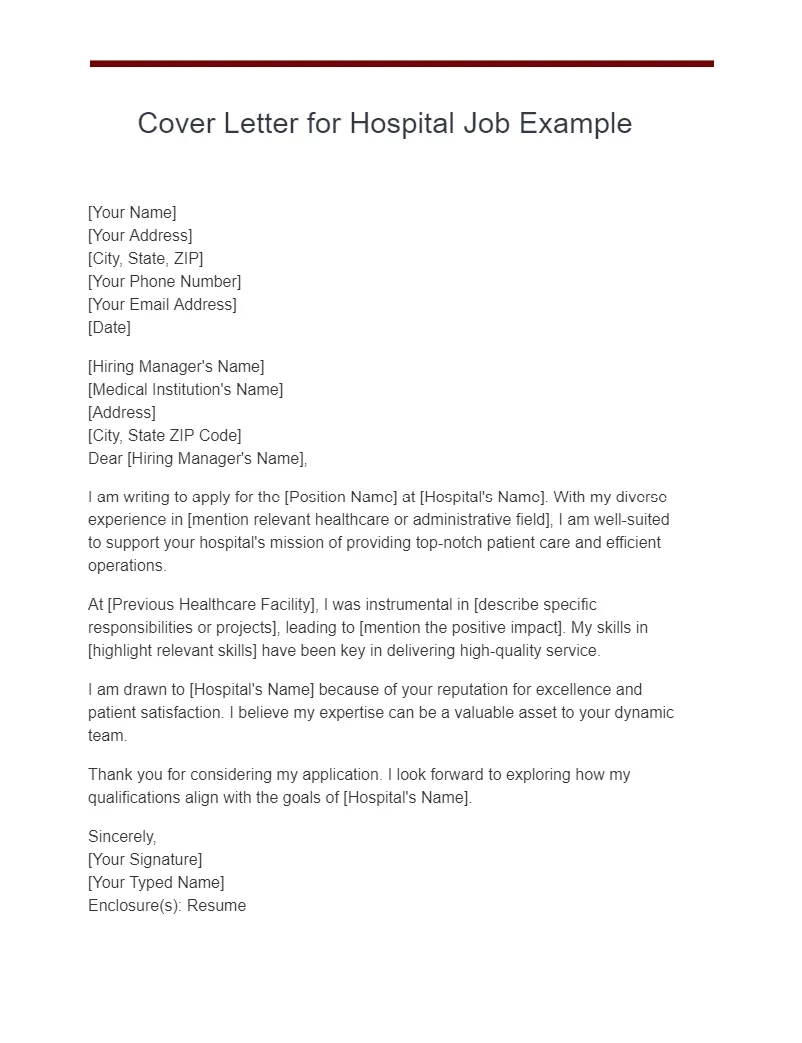
A nurse cover letter should follow a standard business letter format. Use a professional font, such as Times New Roman or Arial, in a size 11 or 12. The letter should be no more than one page long. Start with your contact information, the date, and the employer’s contact information. Open with a clear statement of the position you are applying for and how you found the opportunity. In the body paragraphs, highlight your relevant skills and experience, providing specific examples. Use action verbs to describe your accomplishments and quantify your results whenever possible. Emphasize your compassion, empathy, and ability to provide patient-centered care. Focus on certifications and experience that fit the job requirements. Conclude with a strong closing paragraph that reiterates your interest and includes a call to action. Proofread meticulously for any errors.
Health Care Cover Letter Sample 2 Medical Assistant
This sample targets a Medical Assistant position. It should emphasize clinical and administrative skills, experience with patient care, and any relevant certifications. It should describe experience with vital signs, patient histories, and assisting with medical procedures. It needs to showcase experience with medical office software, scheduling appointments, and managing patient records. The letter should also include any specialized skills, such as phlebotomy or EKG experience. The goal is to make the applicant’s skills and experience match the requirements of the medical assistant role. It should demonstrate an understanding of medical office procedures and a commitment to providing excellent patient care.
Key Skills for Medical Assistants
Key skills for medical assistants include proficiency in clinical and administrative tasks. Clinical skills include taking vital signs, obtaining patient histories, assisting with examinations and procedures, and administering medications. Administrative skills encompass scheduling appointments, managing patient records, handling billing and insurance, and communicating with patients. Medical assistants should be proficient in using electronic health records (EHR) systems and medical office software. Additional skills may include phlebotomy, EKG, and performing basic laboratory tests. Strong communication, interpersonal, and organizational skills are crucial, as is the ability to multitask and work effectively under pressure. Certifications from organizations like the American Association of Medical Assistants (AAMA) can significantly boost your credentials.
Medical Assistant Cover Letter Formatting
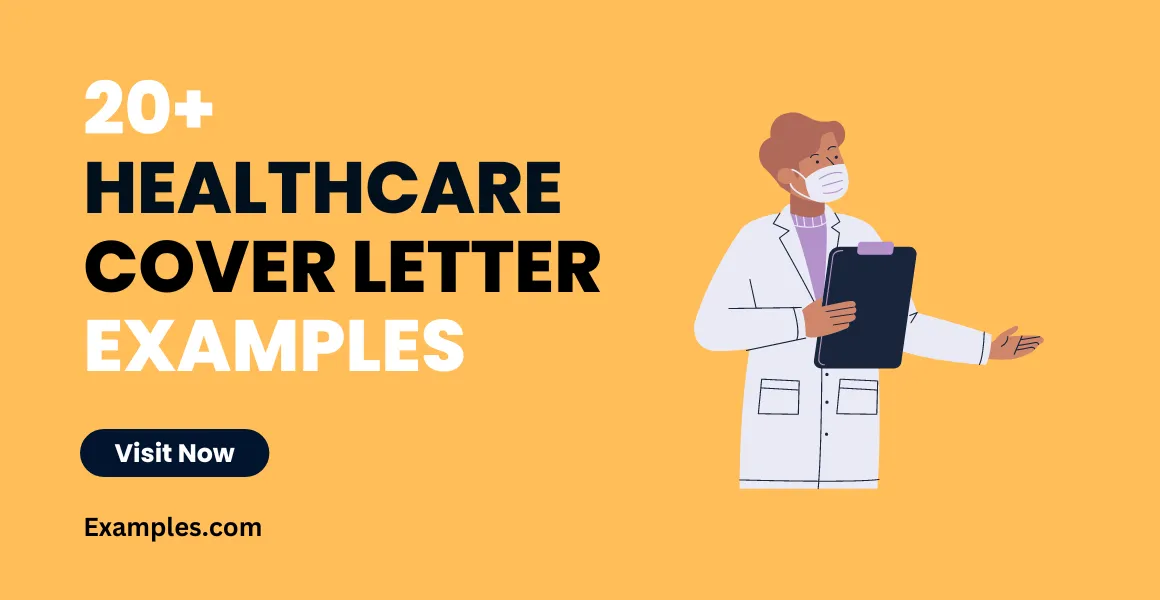
A medical assistant cover letter should have a professional format, and must be concise and easy to read. Use a standard business letter format with a font like Times New Roman or Arial (size 11 or 12). Start with your contact information, the date, and the employer’s contact information. The opening paragraph should state the position you’re applying for and how you learned about the opportunity. The body paragraphs should highlight relevant skills and experiences, aligning them with the job description. Use action verbs and quantify your accomplishments whenever possible. Conclude with a strong closing paragraph that reiterates your interest and includes a call to action. Proofread carefully for grammar and spelling errors.
Health Care Cover Letter Sample 3 Therapist
This sample is aimed at a Therapist position. It should emphasize experience with various therapeutic modalities, such as cognitive behavioral therapy (CBT), mindfulness-based therapy, or psychodynamic therapy. It needs to highlight experience working with specific patient populations, such as children, adolescents, or adults, and demonstrate the ability to conduct assessments, develop treatment plans, and provide individual or group therapy sessions. Your cover letter should showcase your communication skills, your ability to build rapport with clients, and your commitment to ethical practice. Experience with relevant software and insurance billing is also useful. The overall objective is to align your skills and experience with the requirements of the therapist position. Demonstrate a clear understanding of mental health issues, compassion, and the ability to create a safe and supportive environment.
Highlighting Therapy Experience
When highlighting therapy experience, focus on the different therapy types you’ve used, and the results you’ve achieved. Emphasize your experience with evidence-based practices, such as cognitive behavioral therapy (CBT), dialectical behavior therapy (DBT), or acceptance and commitment therapy (ACT). Mention specific populations you have experience working with, such as children, adolescents, adults, or couples. Describe the types of issues you’ve addressed, like depression, anxiety, trauma, or substance abuse. Demonstrate your ability to conduct thorough assessments, develop personalized treatment plans, and monitor client progress. Include any experience leading group therapy sessions or providing family therapy. Quantify your achievements whenever possible, like a percentage of clients who achieved their goals or the average duration of treatment. This will present your abilities to the hiring managers.
Therapist Cover Letter Essentials
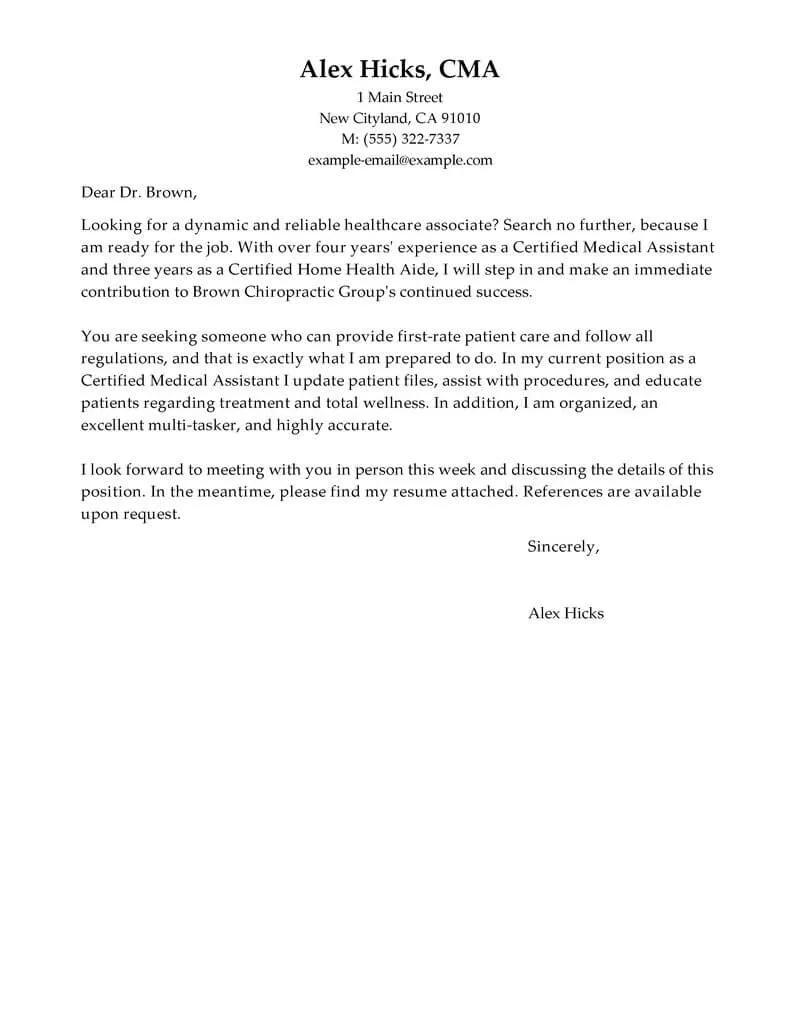
A therapist cover letter should have a professional business letter format. Use a standard font, such as Times New Roman or Arial (size 11 or 12). Begin with your contact information, the date, and the employer’s contact information. The opening paragraph should state the position you’re applying for and express your enthusiasm. In the body paragraphs, highlight your relevant skills, experience, and credentials, focusing on your ability to provide effective therapy services. Emphasize your experience with specific therapeutic modalities and patient populations. Show your ability to build rapport, conduct assessments, and develop treatment plans. Conclude with a strong closing paragraph that reiterates your interest and includes a call to action. Proofread carefully for grammar and spelling errors. Ensure that all the content aligns with ethical guidelines and professional standards for therapists.
Health Care Cover Letter Sample 4 Administrator
This sample is for a Healthcare Administrator position. It should highlight skills in management, leadership, and strategic planning, and experience in healthcare operations, finance, and compliance. It needs to show experience in managing budgets, developing policies, and overseeing staff. Highlight your knowledge of healthcare regulations, accreditation standards, and quality improvement initiatives. It should also include experience with relevant software systems and data analysis. The aim is to match the administrator’s skills and experience with the requirements of the role. The applicant needs to demonstrate expertise in healthcare operations, a strong understanding of financial management, and experience in leading and developing teams.
Administrative Skills to Emphasize
Administrative skills to emphasize include leadership, strategic planning, financial management, and operational efficiency. Demonstrate leadership by highlighting your ability to lead and motivate teams, make decisions, and drive organizational change. Emphasize strategic planning by showcasing your ability to develop and implement strategic goals and initiatives. Highlight your financial management skills by demonstrating your experience with budgeting, financial reporting, and cost control. Demonstrate your understanding of healthcare operations by showcasing your experience with patient flow, quality improvement, and regulatory compliance. Show proficiency with healthcare software, data analysis, and performance metrics. Make sure to showcase effective communication, problem-solving, and interpersonal abilities. Provide quantifiable results to show the impact of your administrative efforts.
Cover Letter Format for Administrators
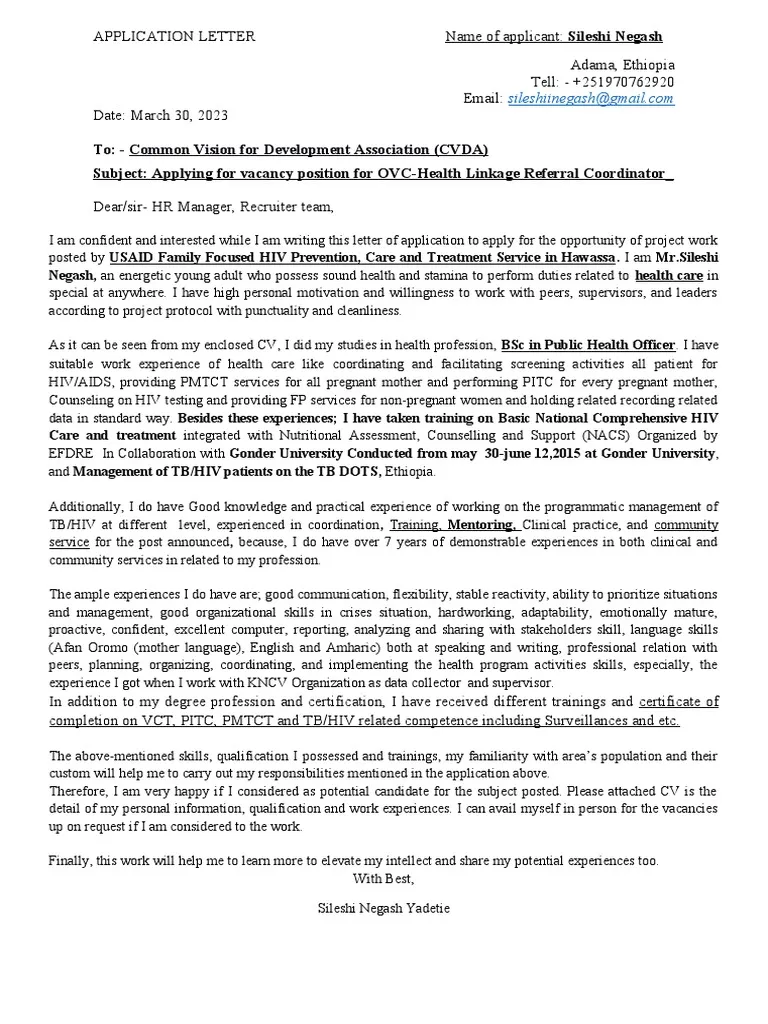
A healthcare administrator cover letter follows the standard business letter format. Start with your contact information, the date, and the employer’s contact information. Open with a clear statement of the position you’re applying for and how you found the opportunity. In the body paragraphs, highlight your most relevant administrative skills and experiences, using specific examples to illustrate your accomplishments. Demonstrate your understanding of the healthcare industry and the specific organization. Show the value you could bring to the role. Make sure to use action verbs, and use a clear, concise, and professional writing style. The cover letter should be no more than one page in length. Close with a statement of your enthusiasm for the role and a call to action. Proofread for grammar and spelling errors before submitting your letter.
Health Care Cover Letter Sample 5 Technician
This sample is for a Health Care Technician. It should focus on clinical skills, technical expertise, and experience with patient care, and highlight any relevant certifications. It needs to describe your experience with specific medical equipment, patient assessments, and assisting with procedures. The cover letter must show the ability to provide compassionate patient care, adhere to safety protocols, and maintain accurate records. Any experience with electronic health records (EHR) and other administrative tasks should be included. The goal is to match the technician’s skills and experience with the requirements of the position. Also demonstrate your understanding of patient care procedures and your commitment to delivering high-quality service.
Highlighting Technical Skills
When highlighting technical skills, focus on the specific equipment, procedures, and software relevant to the job. Include details about the medical equipment you’re proficient in using, such as EKG machines, X-ray machines, or laboratory analyzers. Mention your ability to perform patient assessments, take vital signs, and assist with medical procedures. Show that you’re able to follow protocols, maintain accurate records, and adhere to safety regulations. Also, highlight your experience with electronic health records (EHR) and other administrative tasks. Emphasize any certifications or specialized training you have. Use action verbs to describe your accomplishments and focus on how your skills contribute to patient care and the efficient operation of the healthcare facility. Always provide detailed, specific examples.
Technician Cover Letter Formatting
A technician cover letter should follow a professional business letter format. Use a standard font, such as Times New Roman or Arial, in size 11 or 12. Start with your contact information, the date, and the employer’s contact information. The opening paragraph should clearly state the position you are applying for. In the body paragraphs, highlight your most relevant technical skills and experiences, and show specific examples to demonstrate your abilities. Show your knowledge of relevant medical equipment, your patient care experience, and your commitment to safety and accuracy. The cover letter should be concise, well-organized, and easy to read, and no more than one page long. Close with a statement of your enthusiasm for the role and include a call to action. Proofread carefully for any grammatical errors and spelling mistakes.
Tips for Writing a Great Cover Letter
Creating a standout cover letter involves several key strategies. Tailor your letter to each specific job. Read the job description carefully and identify the key skills and qualifications the employer is seeking. Highlight your skills and experiences that directly align with those requirements. Use action verbs to describe your accomplishments and provide specific examples. Quantify your results whenever possible. Demonstrate your understanding of the healthcare industry and the specific organization you’re applying to. Research the company’s mission, values, and recent initiatives. Show your personality and enthusiasm for the opportunity, but remain professional. Maintain a clear and concise writing style. Avoid jargon and overly complex language. Proofread your cover letter carefully for any errors in grammar, spelling, or punctuation. Ask a friend or colleague to review your letter for a second opinion.
Tailoring Your Letter to Each Job
One of the most important tips for writing a great cover letter is tailoring it to each job. Generic cover letters are easy to spot and often end up in the rejection pile. Start by carefully reading the job description. Identify the key requirements, including skills, experience, and qualifications, that the employer is looking for. Next, assess your own skills and experiences, and identify the ones that best match those requirements. Highlight those skills and experiences in your cover letter, providing specific examples to illustrate your abilities. Customize your letter to the specific organization. Research the company’s mission, values, and recent initiatives. Mention your knowledge of the organization and explain how you can contribute to its success. This will show the hiring manager that you are genuinely interested in the position and have taken the time to learn about the company.
Proofreading and Editing
Proofreading and editing are critical steps in the cover letter writing process. A single typo or grammatical error can undermine your credibility and negatively impact your chances of getting an interview. After you’ve written your cover letter, set it aside for a few hours or even a day, and then return to it with fresh eyes. Read your letter slowly and carefully, looking for any errors in grammar, spelling, punctuation, or formatting. Pay close attention to the tone and style of your writing. Make sure your language is clear, concise, and professional. Consider using a grammar and spell-checking tool to catch any errors you might have missed. However, these tools are not foolproof, so it’s still essential to review your letter manually. Ask a friend, family member, or career counselor to review your cover letter. A second pair of eyes can often catch errors you might have overlooked. Always proofread your letter before submitting it.
Final Thoughts on Cover Letters
Cover letters are more than just a formality; they’re a critical tool for landing your dream healthcare job. By following these tips and examples, you can create cover letters that showcase your skills, experience, and passion for the field. Remember to tailor each letter to the specific job and employer, highlight your relevant qualifications, and proofread carefully for any errors. A well-crafted cover letter can make a lasting impression on hiring managers and significantly increase your chances of securing an interview. In today’s competitive healthcare landscape, a compelling cover letter can set you apart from the competition and open doors to exciting career opportunities. Invest the time and effort to create cover letters that highlight your unique strengths and make a memorable first impression.
